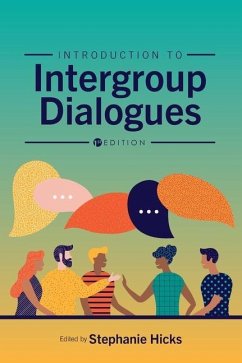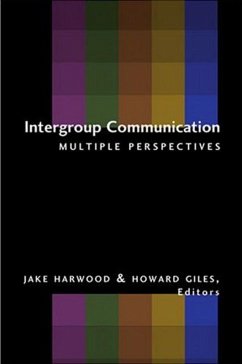
The Oxford Encyclopedia of Intergroup Communication
2-Volume Set
Versandkostenfrei!
Versandfertig in über 4 Wochen

PAYBACK Punkte
203 °P sammeln!




This book is the first encyclopedia dedicated to the burgeoning field of intergroup communication. It explores geographic regions, intergroup communication processes, theories, and applied areas of interest, all pertaining to how human communication processes are influenced by, and themselves influence, the groups to which we all belong.
Howard Giles is Professor and Graduate Advisor in the Department of Communication, University of California, Santa Barbara. He has previously served as chair of the department, as well as assistant dean of Undergraduate Studies in the College of Letters and Science. In 2009, he received the Mark L. Knapp Award of the National Communication Association for career contributions to the study of interpersonal communication. He is a fellow of the American Psychological Association, the British Psychological Society, and the International Communication Association, among others. He is the former president of the International Communication Association and International Association for the Study of Language & Social Psychology. Dr. Giles was also the co-founding chair of the ICA Interest Group on intergroup communication and the Editor of the above recent Handbook of Intergroup Communication. Jake Harwood (Ph.D., University of California, Santa Barbara) is Professor of Communication and former director of the Gerontology program at the University of Arizona. He is author of Understanding Communication and Aging (2007) and Communication and Music (2015), and co-editor of The Dynamics of Intergroup Communication (2011). He has published over 100 articles and chapters on intergenerational communication, intergroup communication and communication and music, including in journals such as Human Communication Research, Journal of Communication, and Personality and Social Psychology Bulletin.
Produktdetails
- Verlag: Hurst & Co.
- Seitenzahl: 1464
- Erscheinungstermin: 9. März 2018
- Englisch
- Abmessung: 272mm x 201mm x 107mm
- Gewicht: 3016g
- ISBN-13: 9780190454524
- ISBN-10: 0190454520
- Artikelnr.: 49327697
Herstellerkennzeichnung
Libri GmbH
Europaallee 1
36244 Bad Hersfeld
gpsr@libri.de
Für dieses Produkt wurde noch keine Bewertung abgegeben. Wir würden uns sehr freuen, wenn du die erste Bewertung schreibst!
Eine Bewertung schreiben
Eine Bewertung schreiben
Andere Kunden interessierten sich für











